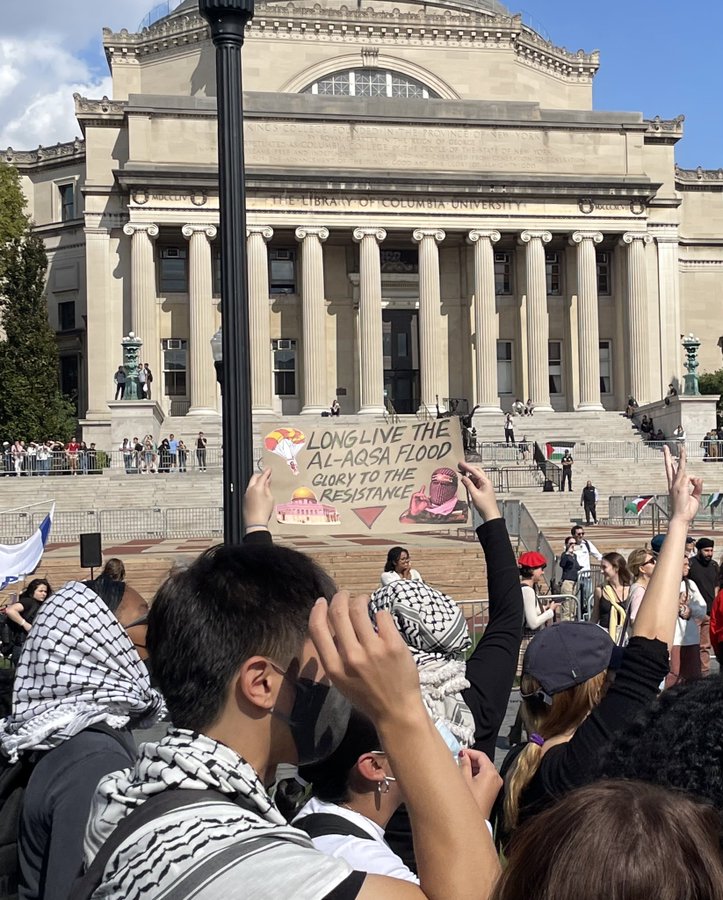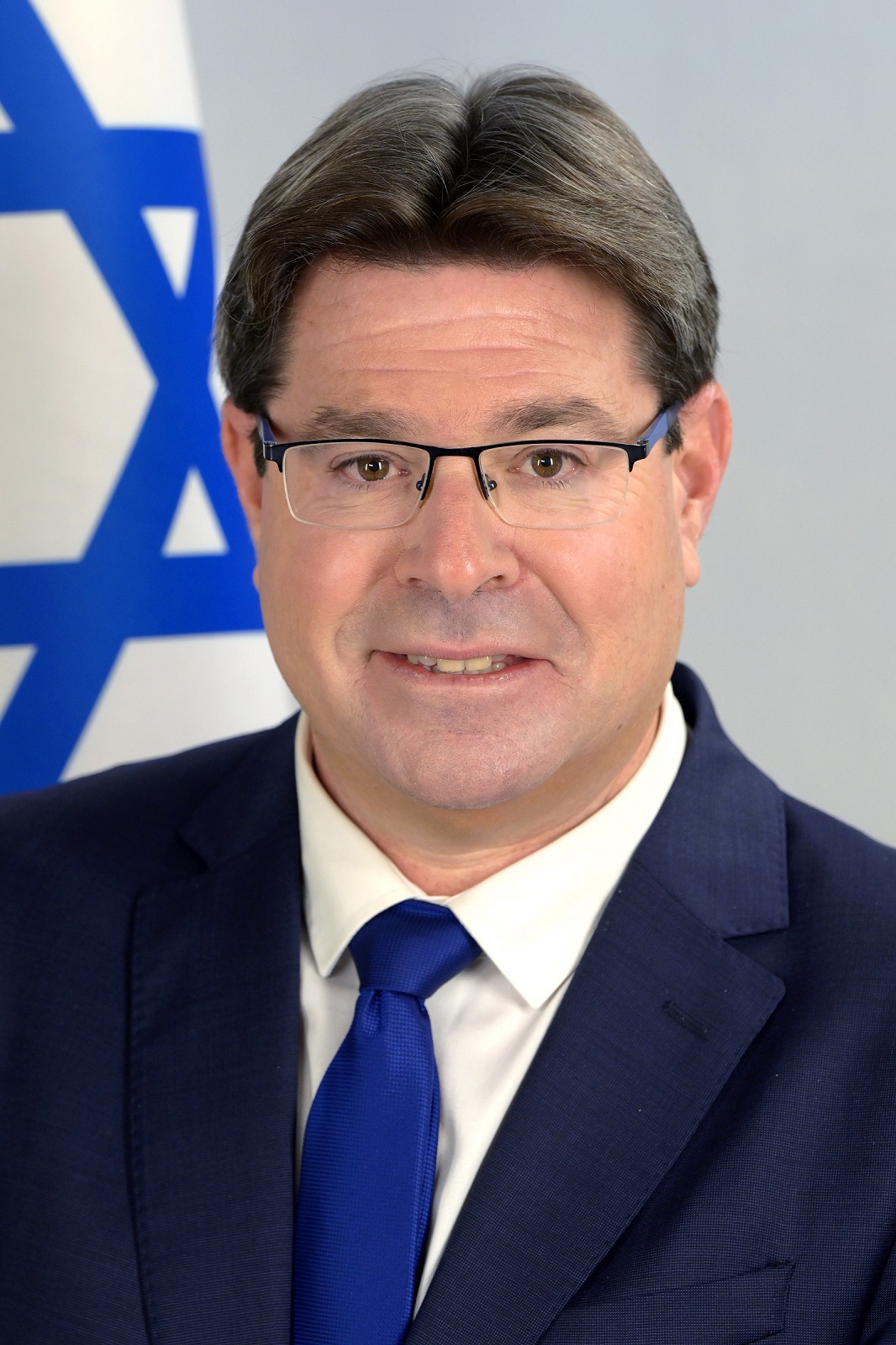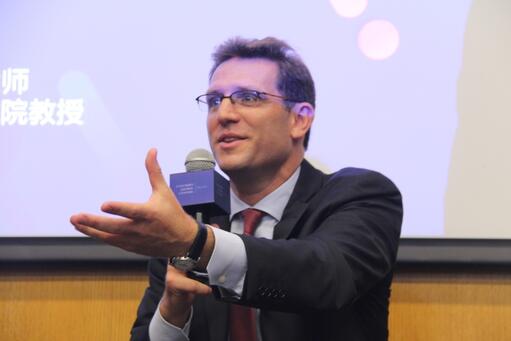[New York] The days between Rosh Hashana and Yom Kippur are the Days of Awe. This year, commemorative events for the first anniversary of October 7 occurred amid these spiritual guideposts, and the impact was both awe-inspiring and awful.
For residents of Manhattan, the 36-hour period between the evening of Oct. 6 and the morning of October 8 was overwhelming, with heartfelt communal gatherings occurring alongside marches and rallies featuring thousands of vocal and passionate anti-Israel protesters. Many shouted their support for terrorist organizations such as Hamas and Hezbollah, chanted slogans that praised the “martyrs,” celebrated “resistance,” and called for “the destruction of Israel and the death of Zionists.” They carried signs that proclaimed “Globalize the intifada” and “Long live the Al-Aqsa Flood.”

An anti-Israel demonstration on the Columbia University campus, Oct. 7, 2024. (Eliana Goldin)
Grotesque but sadly predictable to see anti-Israel groups celebrating terror and terrorist organizations
It is “grotesque but sadly predictable to see anti-Israel groups celebrating terror and terrorist organizations,” wrote Jonathan Greenblatt, CEO of the Anti-Defamation League that morning on X.
Videos and photos from October 7 in New York City show drivers being assaulted and spat upon by women in Muslim head coverings who screamed, “I love Hamas!” Footage emerged of Todd Richman, co-chair of Democratic Majority for Israel, being attacked in Union Square by masked protesters who tried to grab an Israeli flag out of his hand, cursed at him, and hit him.
“I’m stuck in my apartment with the protest on my street. They shut down Park Avenue,” a Jewish community organizer told The Media Line, sending photographs that showed a pro-Palestinian mob outside of her midtown apartment. Though she had planned to attend a memorial service later that day, the experience left her “worn out,” she said.

Park Avenue and 36th Street. (Shira Dicker/The Media Line)
Whether on Wall Street, in Union Square, or uptown at the Columbia University campus, the day devoted to preserving the memory of the thousands who were murdered, kidnapped, tortured, injured, and terrorized on Oct. 7 was an often-harrowing experience. A robust police presence shut down streets and avenues, making navigating the city challenging.
“One year ago, on Oct. 7, we saw the devil on earth,” said Ofir Akunis, the consul general of Israel in New York. Regarding the hateful rhetoric and presence of the anti-Israel protestors, “Shame on them to do it today,” he said.

Israeli Consul General Ofir Akunis, Jan. 9, 2023. (Avi Ohayon/GPO)
Akunis spoke at the Community-Wide Commemoration of Oct. 7, which took place on Monday evening in Central Park. This event, and one that took place across town the previous evening, formed distinctive bookends for marking this somber day.
Give the gift of hope
We practice what we preach:
accurate, fearless journalism. But we can't do it alone.
- On the ground in Gaza, Syria, Israel, Egypt, Pakistan, and more
- Our program trained more than 100 journalists
- Calling out fake news and reporting real facts
- On the ground in Gaza, Syria, Israel, Egypt, Pakistan, and more
- Our program trained more than 100 journalists
- Calling out fake news and reporting real facts
Join us.
Support The Media Line. Save democracy.


On Sunday evening, an interfaith service at the Church of St. Paul and St. Andrew was presented in partnership with a consortium of liberal synagogues and nonprofits devoted to furthering women’s work and peacemaking. Titled “Hand in Hand We Heal: A Gathering for Oct. 7 and This Year of Sorrow,” the program featured musical performances and the accounts of both Israeli Jews and Palestinians and opportunities for people to share their personal accounts.
We recognize that not only was this day the worst day for Israelis, but it marked the beginning of the bloodiest year for Palestinians
“We recognize that not only was this day the worst day for Israelis, but it marked the beginning of the bloodiest year for Palestinians,” Tamara Gayer, chair of the steering committee of Friends of Standing Together NYC, told The Media Line. Further, she said, Oct. 7 was not a “stand-alone event that just happened out of nowhere.”
The following evening, the tragedy of Oct. 7 was dignified at the Community-Wide Commemoration of October 7 in Central Park. Hosted by UJA-Federation of New York with the Jewish Community Relations Council and Bring Them Home Now, the three-hour event was live-streamed at Temple Emanu-El and locations around the country, drawing hundreds of thousands of audience members and viewers.
For us, life as we knew it stopped on Oct. 6
People endured long security lines to be part of the star-studded event, which ran the gamut from heartbreaking to horrific to hopeful. It included the testimony of survivors of the Nova Music Festival massacre and the Gaza Envelope kibbutzim as well as tributes to those who were murdered there, soulful prayers by local cantors and rabbis, addresses by hostage families, including Ronen and Orna Neutra, the parents of American hostage Omer Neutra, who is about to turn 23 in captivity. He is a New York native. “For us, life as we knew it stopped on Oct. 6,” said Orna, articulating the inconceivable reality that she and her husband are “standing here still one year later … caught up in a true political nightmare.”
The event featured the presence of elected officials, including New York governor Kathy Hochul and New York City Mayor Eric Adams, as well as Jewish communal leaders. It treated its audience to Israeli Eurovision star Eden Golan singing “October Rain” and David Broza performing the Israeli classic song, “Yihiyeh Tov,” with the help of choir members of the Israeli scouts, the Tzofim. Students from three local Jewish high schools sang songs in Hebrew and English, and the members of a local gospel choir sang a rendition of Leonard Cohen’s “Hallelujah.” The program ended with musical superstar Regina Spektor performing three songs, two taken from the High Holiday liturgy.
The Central Park event was the culmination of a day that aimed to deliver “comfort and strength,” Hindy Poupko, UJA-Federation’s senior vice president of community planning and external relations, told The Media Line. “The events were inspired by our community’s unwavering solidarity and generosity and the unbreakable bond between New York and Israel that has only strengthened and deepened in the last year.”

Hindy Poupko, UJA-Federation’s senior vice president of community planning and external relations. (Courtesy)
Daniella Kahane, a Columbia alum and filmmaker working on a documentary about radicalization on college campuses, specifically focused on Columbia, witnessed the fortitude of the local Jewish community. Due to heightened security, Kahane was unable to access the campus with her alum ID. She stood at the Broadway gate filming, receiving footage and testimonials from Jewish students inside. She was deeply shaken by what she saw.

Daniella Kahane. (Courtesy)
“It is horrific that the university doesn’t have the decency and common sense to create a boundary around Oct. 7 for its community and not allow students to rally in a hateful way around these Jewish and Israeli students, all of whom were directly affected by this day,” she told The Media Line. She described the students observing a dignified day of mourning, while “hundreds of masked, keffiyeh-wearing students who staged a walkout are screaming horrible chants against [them]. It is really repugnant,” she said.
Echoing the complaints of others, including a consortium of professors who circulated a petition one month ago, Kahane alleged that Columbia “does not do a great job at enforcing policy or putting up guardrails to create a safe and respectful environment.” What she witnessed at her alma mater made her feel “very sad, very heartbroken” to realize that “those who are screaming for your death are actual members of the current Columbia community.”
Ran Kivetz watched the anti-Israel protests on the campus from Israel. He is the Philip H. Geier professor of business at Columbia University. “What you saw at Columbia, you also saw on the streets of New York City and in certain European countries like Ireland, Spain, and Norway,” he told The Media Line. “Columbia has tossed its hat into the ring with terror supporters.”

Prof. Ran Kivetz. (Courtesy)
The university’s recently appointed interim president, Katrina Armstrong, released a letter on October 6 stating that “we have several student groups planning for special events and nonviolent protests and are working diligently to support those plans with public safety and delegate support” and that unauthorized protests would not be allowed, Jewish students who had prepared a memorial on campus found themselves beset by hundreds of hostile protestors who were “yelling about intifada and celebrating Hamas atrocities,” Kivetz said.
This scene is documented on the front page of the New York Post, which bears a one-word headline: “Despicable.”

(New York Post)
Kivetz said that despite carefully worded communications from Armstrong, the university “has done nothing to enforce its rules and regulations” and was “moving literally in the wrong direction.”
Filmmaker Kahane agrees with Kivetz, adding that much of the tolerance for antisemitism is “coming from the administration and the professors. It is a cross-sectional issue, very much systemic and very long in the making,” she said.
Reflecting on the interfaith event her synagogue co-sponsored on the evening of Oct. 6, Rabbi Shuli Passow, the chief program and engagement officer at Bnai Jeshurun, said that it was “a light in the darkness to hear from women who, despite the horrors of living through this war, remain committed to rejecting the false binary that one can be only ‘pro-Israel’ or ‘pro-Palestinian.’ We need to mourn, but we cannot give ourselves over to despair, and these women helped show us how it is possible to imagine a different future,” she told The Media Line.
Building on that theme, perhaps the true legacy of the first anniversary of Oct. 7 in Manhattan belongs to the performer Regina Spektor, who closed out the Monday night commemoration in Central Park. “I have no idea what voice is going to come out of my mouth because I have never sung after two hours of straight crying,” Spektor said as she sat down at the piano. “I am so grateful for all these brave, amazing people that have spoken, that are standing by their families … that are mourning, that are hoping, that are praying, that are singing, that are dancing again together. … I’m so grateful for all of you.”